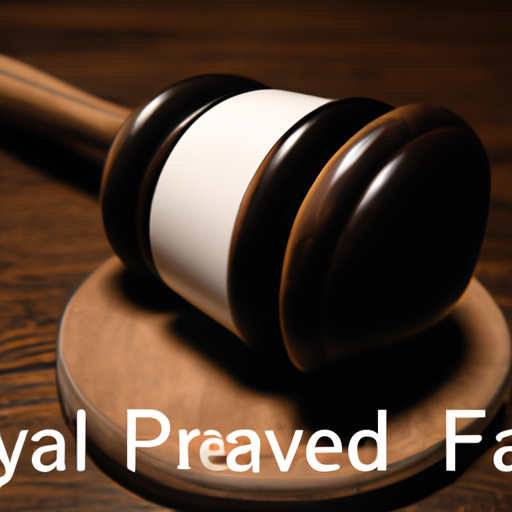In the criminal trial process, understanding the legal procedures and steps involved is crucial for anyone facing criminal charges. From the initial arrest to the final verdict, each stage of the trial carries significant weight and potential consequences. As a renowned criminal defense attorney, our expertise lies in guiding individuals through this complex process, advocating for their rights, and ensuring a fair and just trial. Through informative blog posts and engaging case studies, we aim to demystify the legal jargon, address common concerns, and provide a sense of reassurance and guidance to those in need. By crafting compelling content and showcasing our experience, we hope to instill confidence in our potential clients and help them take the next step towards seeking legal assistance. Call us today to schedule a consultation and let us be your trusted ally in the criminal trial process.
Criminal Trial Process
The criminal trial process is a complex and important part of the legal system. Understanding the various stages can be crucial in ensuring a fair and just outcome for all parties involved. This article will provide an overview of each stage, from the pre-trial phase to the post-trial stage, giving you a comprehensive understanding of what to expect if you find yourself facing criminal charges.

Pre-Trial Stage
1. Arrest and Investigation
The first stage of the criminal trial process is the arrest and investigation. This occurs when law enforcement authorities have reason to believe that a crime has been committed and they have gathered enough evidence to support an arrest. During this stage, the police will conduct a thorough investigation, gathering witness statements, collecting physical evidence, and interviewing potential suspects.
2. Charging Decision
Following the investigation, the prosecuting attorney will review the evidence and determine whether or not to file formal charges against the accused. This decision will be based on the strength of the evidence and the likelihood of securing a conviction at trial. If charges are filed, the accused will be formally notified and provided with a copy of the charges.
3. Initial Appearance
Once charges have been filed, the accused will have their initial appearance in court. During this stage, the judge will inform the accused of their rights, including the right to legal representation, and the charges against them. If the accused cannot afford an attorney, they may request a court-appointed lawyer at this time.
4. Bail Hearing
If the accused is not considered a flight risk or a danger to the community, they may be eligible for bail. A bail hearing will be held to determine the amount of bail required for the accused to be released from custody pending trial. Factors such as the severity of the charges, the defendant’s criminal history, and their ties to the community will be taken into consideration when determining bail.
5. Preliminary Hearing
In cases where the accused has been charged with a felony, a preliminary hearing will take place. During this stage, the prosecution must present enough evidence to establish probable cause that the accused committed the crime. If probable cause is established, the case will proceed to trial. If not, the charges may be reduced or dismissed.
6. Plea Bargaining
Before the trial commences, the prosecution and defense may engage in plea bargaining. This is a negotiation process where the accused may agree to plead guilty in exchange for a reduced sentence or lesser charges. Plea bargaining can be a strategic decision for both the prosecution and the defense to avoid the time and expense of a trial.
Trial Stage
1. Jury Selection
The trial stage begins with the selection of a jury. The jury is a group of impartial individuals who will listen to the evidence presented at trial and make a determination of guilt or innocence. The jury selection process involves questioning potential jurors to ensure they can be fair and unbiased in their decision-making.
2. Opening Statements
Once the jury is selected, the trial will begin with opening statements. The prosecution goes first, laying out their case and presenting an overview of the evidence they plan to present. The defense then has the opportunity to present their own opening statement, outlining their theory of the case and highlighting any weaknesses in the prosecution’s argument.
3. Presentation of Evidence
During the trial, both the prosecution and the defense will present their evidence. This may include witness testimony, physical evidence, expert testimony, and other forms of evidence relevant to the case. Each side has the opportunity to examine and cross-examine witnesses to establish the credibility of their testimony.
4. Examination and Cross-Examination
The examination and cross-examination of witnesses are crucial stages of the trial process. The prosecution will first examine their witnesses, asking questions to elicit relevant information and strengthen their case. The defense will then have the opportunity to cross-examine these witnesses, questioning their credibility or attempting to undermine their testimony.
5. Closing Arguments
After all evidence has been presented, both the prosecution and the defense will have the opportunity to present their closing arguments. This is their final opportunity to persuade the jury of their position and summarize the evidence presented during the trial. The prosecution will present their argument first, followed by the defense.

Post-Trial Stage
1. Jury Deliberation
Once the closing arguments have been made, the jury will be sequestered to deliberate on the case. They will review the evidence, weigh the credibility of the witnesses, and discuss the merits of the case. The jury must reach a unanimous decision to either convict or acquit the accused.
2. Verdict
After deliberation, the jury will return with their verdict. If the jury finds the accused guilty, a conviction will be entered, and the case will proceed to the sentencing stage. If the jury finds the accused not guilty, they will be acquitted of the charges, and the case will be dismissed.
3. Sentencing
In the event of a guilty verdict, the sentencing stage will begin. During this stage, the judge will consider various factors, such as the severity of the crime, the defendant’s criminal history, and any mitigating or aggravating circumstances, to determine an appropriate sentence. The judge may also consider the recommendations of the prosecution and defense attorneys.
4. Appeals
After sentencing, the convicted individual may choose to appeal their case if they believe there were errors or issues during the trial that affected the outcome. The appeals process involves reviewing the trial record and presenting arguments to a higher court that the conviction should be overturned or that a new trial should be held.
FAQs
-
What is the role of a defense attorney during a criminal trial? A defense attorney’s role is to advocate for the accused and ensure that their rights are protected throughout the trial process. They will examine and challenge the prosecution’s evidence, cross-examine witnesses, and present a strong defense strategy on behalf of their client.
-
Can a guilty plea be withdrawn? In certain circumstances, a guilty plea may be withdrawn. The accused may need to demonstrate that they did not fully understand the consequences of their plea or that there was a violation of their constitutional rights during the plea process.
-
What happens if the jury cannot reach a unanimous verdict? If the jury cannot reach a unanimous verdict, it is considered a hung jury. In such cases, the judge may declare a mistrial, and the case may be retried with a new jury.
-
How long does the criminal trial process typically take? The duration of the criminal trial process can vary greatly depending on the complexity of the case, the court’s schedule, and other factors. Some trials can be concluded within a few days, while others may stretch out over several weeks or months.
-
Can I represent myself in a criminal trial? While it is legally possible to represent yourself in a criminal trial, it is generally not recommended. Criminal law is complex, and the consequences of a conviction can be severe. It is advisable to seek the guidance and expertise of an experienced criminal defense attorney to protect your rights and achieve the best possible outcome.



